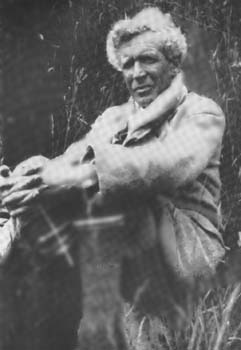
Are You There Old Chap?
by Alex Carnevale
Famous for never reading things he wrote, the British and Welsh writer John Cowper Powys is one of the great treasures of world lit. Dying in 1963, Powys lived a crazy life of affairs and absolution, letters and enemas. His classic book is A Glastonbury Romance, and it's where newbies should start. His Autobiography is also extraordinary and badly deserves a new worldwide release. He spent a lot of his life going around giving lectures, and his health often failed him.
"Karma Police" - String Quartet Tribute to Radiohead (mp3)
"Climbing Up the Walls" - String Quartet Tribute to Radiohead (mp3)
"Paranoid Android" - String Quartet Tribute to Radiohead (mp3)
John Cowper Powys was born in Derbyshire. He was called for the defense in the Ulysses obscenity trial, and he was also a great friend of the revolutionary anarchist Emma Goldman. He wrote to Henry Miller rather often. Although, as Ronald Hall notes in his long introduction, his books are in many ways the polar opposite of Miller's work, he admired Henry very much. Cowper Powys has been largely forgotten, but thanks to the efforts of those abroad who admire his work, he is making a comeback. He is a thoroughly decent, unreligious man, the kind we probably always need.

This letter to Henry Miller was Cowper Powys' last, or at the very least, the last that we know of. It is from the paperback collection, Letters to Henry Miller. The ending is the perfect Cowper Powys synthesis of the serious, the mind-bendingly sad, and the sublime.
The Last Letter of John Cowper Powys to Henry Miller
My dear Henry
O yes I well remember your talking about Lawrence Durrell tho' I've never seen him. But I thought I had met Richard Aldington--but no! I was thinking Richard Arlington Robinson. My only trouble from old age, for I'll be 87 next October, is loss of Memory...otherwise I'm in splendid health and spirits.

Lawrence Durrell
Phyllis Playter and I have never heard of Rozanov. We must try to get hold of 'Solitaria' and 'The Apocalypse of our Time.'
Aye! but what an exciting trip you sure did have! I've never been to any one of those places you describe though my instinctive sexual lechery has always had, from my boyhood, a Sadistic tendency but I never saw that place where the Marquis de Sade lived tho' I do remember that when, in the French Revolution, they took the Bastille the only prisoner they found there to liberate was De Sade!

Henry Miller
Think of your visiting Vanclue (Lacosti) near Laura & Petrargue and L'Ile-sur-Sorgne. Think of your stopping in a house that has the only 'Loo' in town! I take it that means what in America they call a Lavatory and what over here we call a W.C. or Water-Closet! Well we have a 'loo' on the right spot, for our little house with only two rooms has an excellent loo! as well as being half of the house called Waterloo! All our visitors think that Waterloo is a street or a Terrace whereas is is just one house divided into two halves and our half, No. 1, is built under what they call a Ramp a steep ascent with a 12 feet stone wall and big Iron railings.
I love your answer to Paul Morand of whom by the way I have never heard : but he certainly was what at school we used to call 'a decent chap' to accept so well your preference for vagabonds and lunatics and imbeciles! -- over Academicians!
O my dear Henry but how I do sympathise with your praying to the Roman Gods!
That's the point where you and I meet and agree heart-whole--our tendency to pray really and truly to pray--just as when kids we were taught to pray to 'God', that horrid Monster of infernal cruelty--far worse than The Devil! And how good to my ears it is to hear you say about the superiority of the Roman buildings you've got out there to the Mediaeval & Renaissance ones!
Aye my dear but I do so love to hear of that Retired Seaman you have near you with whom you talk and of Nostradamus under whose influence you are now on your travels. Jesus, yes! and I love to think of your talks with your old friend to whom at death you will say, 'Are you there, old chap?'

You must have more life love in you, my dear Henry, than I have for though I am very strong and very happy and very well, when I am dead I shall want to stay dead. No, although I am enjoying my present life enormously, I don't want at all to live after I am dead--not at all--O let me stay dead, I shall pray to my favourite goddess Pallas Athene who, when she was born in his belly, broke out with her shield and her spear through the top of her Daddy's Skull !!! No it's queer that, though I love my present life so much and am more in love with Phyliss than any other girl in all my life and I have not got the faintest touch of homo-sexuality in me, I don't want to live after death. So I just say to God--go to the Devil ! What I want is to stay dead.
Love to you & your Lady & your children with
both of whom I have
exchanged letters
ever
your
old
Friar
John
You can buy a used copy of Letters to Henry Miller here.

Porius, brought out by Overlook Press, has been restored to its interminable length and amazingly large cast of characters. It is a brilliant mess of a book that takes place in 499 A.D. and its commentary on lust and life is enrapturing, creating a narrative that reminds one of an anti-Bible. I like picking Porius up at different places and seeing where Powys' mind takes the thought--it's the most fun journey I can imagine. The following excerpts are taken from Morine Krissdottir's excellent biography of Powys.
Buy Porius here.

From Descents of Memory: The Life of John Cowper Powys
Powys liked to project the illusion that he was a "charlatan" – someone who would become enthralled by "something exciting in life or nature or books or history or psyschology" and work out the idea without bothering to get the details correct." His best novels simply do not bear this out. He may interpret the details to suit his own needs, but the details themselves and the substructure on which he builds are scrupulously worked out.
Just as A Glastonbury Romance grew out of the Grail myth, so Porius is grounded in the firm foundation of the alchemical transformation, each of the seven stages worked out methodically, every essential image and occult symbol in its proper place. Although the ostensible goal of alchemy was to transform base metals in to gold, many of the texts made it clear that the often dangerous chemical procedures were but outer manifestations of the inner search for the "secret" or meaning of the whole material universe and on a personal level, an outer symbol of what was also an inner, psychic process; an allegory of the transformation of man.

Another reality which was intensely sexual was his use of enemas. One of the "subtler aspects" of Powys's ulcer was that he knew the fiberless diet he insisted upon was "hopelessly constipating," so constipating that he had long resorted to enemas. He frankly admitted that he had "come greatly to prefer this artificial method to the natural one!"
Enemas brought back memories of the nursery when the Powys children were routinely given enemas to "keep the bowels open," and John had been using them since at least 1910. For some years he gave them to himself with a handheld clyster. However, after the Indian episode in 1932, he asked Phyllis to "help" him with them.
Neither of them could avoid being aware that the anal sphincter has sensitive nerve endings, and the introduction of an enema nozzle could be experienced as sexually pleasurable-in effect a buggering. At the same time, perversely, there were strong sadomasochistic elements for both of them in the procedure itself.
A favourite subject in the pornographic literature he was familiar with involved the forced administration of an enema and the attendant humiliation of the victim. Possibly for Powys it became another masochistic turn-on. Whether it was or not, the regime was a strict one; he insisted on an enema every third day.
Even when she was prostrate with her period, he had her come down from the bedroom to administer it, although he hated to see her look "so white, so tired, so pinched, so haggard."
Once he began relying totally on enemas, he had another valid reason for never lecturing again, indeed for not leaving Phudd at all for more than two days. Once she began delivering the enema, it was also impossible for her to get away. When he un-learned how to give himself an enema, he learned how not to be abandoned.
Buy Descents of Memory here.
Download Powys' The Complex Vision.
Alex Carnevale is the editor of This Recording.

PREVIOUSLY ON THIS RECORDING
I would do anything for love, but I won't do that.
Me keeping Danish and Molly happy.
The blue streak.

